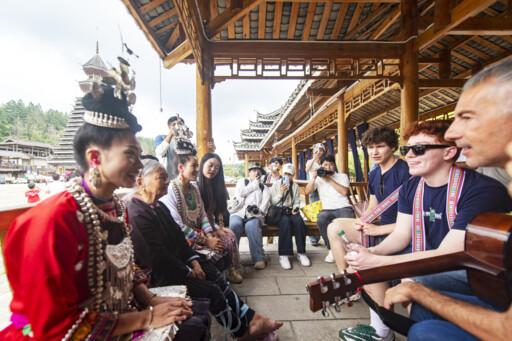


New folklore studies bridges tradition and modernity, local and global

On July 16, six European musicians embarked on a musical field trip to Xiaohuang and Meide Dong villages in Guizhou’s Qiandongnan Prefecture, where they connected with bearers of the region’s ICH to explore modern expressions of traditional music. Photo: IC PHOTO
From the early 1980s to around 2000, the international academic community collaboratively undertook an intellectual innovation by reinterpreting the concept of “folk” within the framework of intangible cultural heritage (ICH). This marked a new phase in the development of folklore studies: the field has not only transcended the binary opposition between rural tradition and urban modernity, but has also overcome the long-standing limitations of nation-specific approaches, increasingly evolving into a discipline integrated into the modern world.
Domestically, classical modern folklore studies contributes to nation building by cultivating cultural identity; internationally, it responds to the global order by highlighting national cultural differences. It transforms specific practitioners of living culture into citizens, creating a collective conception of “the folk.” In this process of abstraction, specific individuals are “effaced,”—reduced to mere instruments of academic inquiry. New folklore studies, in contrast, rediscovers these specific practitioners: they remain the starting point of research, while also becoming its ultimate goal and rightful beneficiaries. This shift is both necessitated by new academic ethics and enabled by new social conditions.
Whereas in the past, research subjects could only be represented through text and images, today they can authentically interact with audiences through travel, public performances, and exhibitions. As people move across borders, new folklore studies, with its sustained focus on “real individuals,” naturally extends its gaze to transnational activities. It captures the realities of transnational folklore and showcases global cultural diversity, no longer confined to the scope of national folklore. The focus on both individual and supranational levels has served as a key pathway to knowledge production in new folklore studies.
Modernization is often accompanied by tensions between tradition and modernity. But as modernity enters a new phase, their integration has become mainstream—tradition now constitutes an integral part of modernity. Folklore’s productive and constructive roles in politics and economics have been widely acknowledged, and the living traditions emerging from daily life are being sustained and revitalized through modern technologies. New folklore studies does not view living traditions as cultural remnants destined to perish, but as vibrant cultural heritage preserved through the commitments from multiple parties.
Folklore studies has demonstrated its theoretical and methodological value through engagement in ICH preservation both domestically and internationally. Folklorists participate in identifying folk cultural practices and nominating representative ICH items, providing cultural resources for cultivating ethnic and national identity while ensuring that individual or collective bearers play an essential, irreplaceable role in related activities. Scholars also recommend entries for inscription on UNESCO’s Representative List of the Intangible Cultural Heritage of Humanity, ensuring these traditions are internationally recognized and appreciated.
This new model allows folklore studies to move beyond national boundaries and participate meaningfully in global affairs. In doing so, it serves national interests from an elevated vantage point while also creatively addressing the needs of individuals, local communities, and humanity as a shared community. Globally-oriented folklore studies does not reject nation-specific approaches; rather, it represents the field’s efforts to keep pace with modern state-building, thereby establishing itself in the new era as an academic discipline that is both nationally rooted and globally engaged.
The emergence of globally-oriented folklore studies—which embraces and elevates regional and national folklore—is fundamentally underpinned by contemporary technological advancements that bring new possibilities to people’s everyday life. In the past, constrained by geographical distance and limited means of communication, people tended to live in fixed locations, and rich, complex contextual information was difficult to convey. Today, modern infrastructure makes long-distance travel, livestreaming, and instant messaging commonplace. People are either physically present at events or obtain on-site information via new media, enabling near-complete transmission of and easy access to folklore-related content.
Today, folklore studies contributes not only to the cultural development of modern states at the national level, but also to the modern project of cultural diversity from the perspective of a shared human community. Through the sharing processes facilitated by ICH preservation, diverse forms of folklore collectively foster a sense of “we” across local, ethnic, and national dimensions. Individuals, local communities, ethnic groups, and states alike can gain recognition and appreciation on the global stage by using folklore as a bridge.
Gao Bingzhong is a professor from the Research Center for Intangible Cultural Heritage at Beijing Normal University. Yang Shanshan is from the School of Sociology at Beijing Normal University.
Editor:Yu Hui
Copyright©2023 CSSN All Rights Reserved